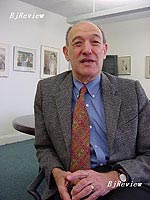| Home / Premier Wen Visits S.Korea.Japan / Beijing Review | Tools: Save | Print | E-mail | Most Read |
| Handling History |
| Adjust font size: |
If mishandled, disputes over historical issues could remain an obstacle to the further improvement of bilateral ties between By Wang Yanjuan & Chen Wen
Disputes over historical issues have been a factor affecting China-Japan relations for quite some time. If mishandled, they could remain an obstacle to the further improvement of , some American scholars believe. Richard C. Bush, senior fellow and director of the Center for Northeast Asian Policy Studies at the Brookings Institution; Richard J. Samuels, Director of the Center for International Studies at the Massachusetts Institute of Technology (MIT) and Founding Director of the MIT Japan Program; and Ezra F. Vogel, a renowned U.S. scholar who specialized in East Asian studies and now is emeritus Henry Ford II Professor of the Social Sciences at Harvard University, shared their views on this issue with Beijing Review. Richard C. Bush: This is a very complicated issue and it has evolved over time.
Richard J. Samuels: Americans are critical of Ezra F. Vogel: I think (former Chinese leader) Deng Xiaoping put it well when he went to What are the major challenges affecting bilateral relations? Samuels: For the Japanese side, there is a failure to confront the history issue. There is a group of quite powerful and quite influential conservatives in Bush: I think the major challenge has to do with the security relationship.
Vogel: They will both be the great powers for the rest of the century and they have many common interests: trade, finding energy resources, avoiding pollution problems, avoiding accidents, avoiding conflicts over What action may the administration of Prime Minister Shinzo Abe take in dealing with the history issue? Samuels: I think the Abe administration will be more pragmatic and they'll back down from the more aggressively revisionist position. They may not believe it's correct in their view of history but they are going to step back because there is too much at stake: the relationship with Bush: One step that the Abe administration has already taken in the wake of the prime minister's visit to
Emphasizing the positive interests that both countries share can be very important. I do think that over time it is important to find ways for the two countries to reconcile over these very tragic issues. Vogel: It's not clear what kind of actions Abe will take, because any political leader, especially in a democracy, must consider views from the political standpoint in the country. As you know, Abe has been losing popular support. If he feels that he needs to get more public support, he should do things like visiting the Yasukuni Shrine, but that will be bad for international relations. On the other hand, if things go well between What should be done by both sides? Samuels: The Japanese have to confront history more squarely and begin to have a conversation with the Chinese side. And the Chinese side has to resolve not to maintain the anti-Japanese feeling. Anti-Japanese sentiment in I think they have to be more open to the idea of full public education. The Chinese textbooks are like the Japanese textbooks in the way in which they limit a full account of the war and the relationship over the following 60 years. I think focusing on Bush: (Currently) in each society, the media plays a role, and the education system plays a role. In If the history issue is mishandled it could be an obstacle (to bilateral ties). But with proper leadership on both sides and responsible management and correct management, it doesn't have to be an obstacle. What is your expectation about the China-Japan Joint History Research Committee, which aims to narrow the differences between the two countries? Vogel: The joint group can accomplish something but it's very difficult, because when you have government officials on both sides, they will represent the emotions of the people. So the experience of I think it has the potential to be very helpful, but sometimes when the two governments talk about the issue, they have very different points of view. It's easy to get into arguments. So it could be helpful, but I think it's also somewhat risky when there are just two countries doing it. I think it's helpful when other countries are involved. That's why when I organized the conferences on World War II, we included scholars from other countries as well. That was appreciated by both the Chinese and Japanese. It just reduced the chances for arguments. And we encouraged everybody to take a scholarly point of view instead of just having two sides quarreling with each other. ( |
| Tools: Save | Print | E-mail | Most Read |
 |
| Related Stories |
 |
 |
|
 |
| Links |


